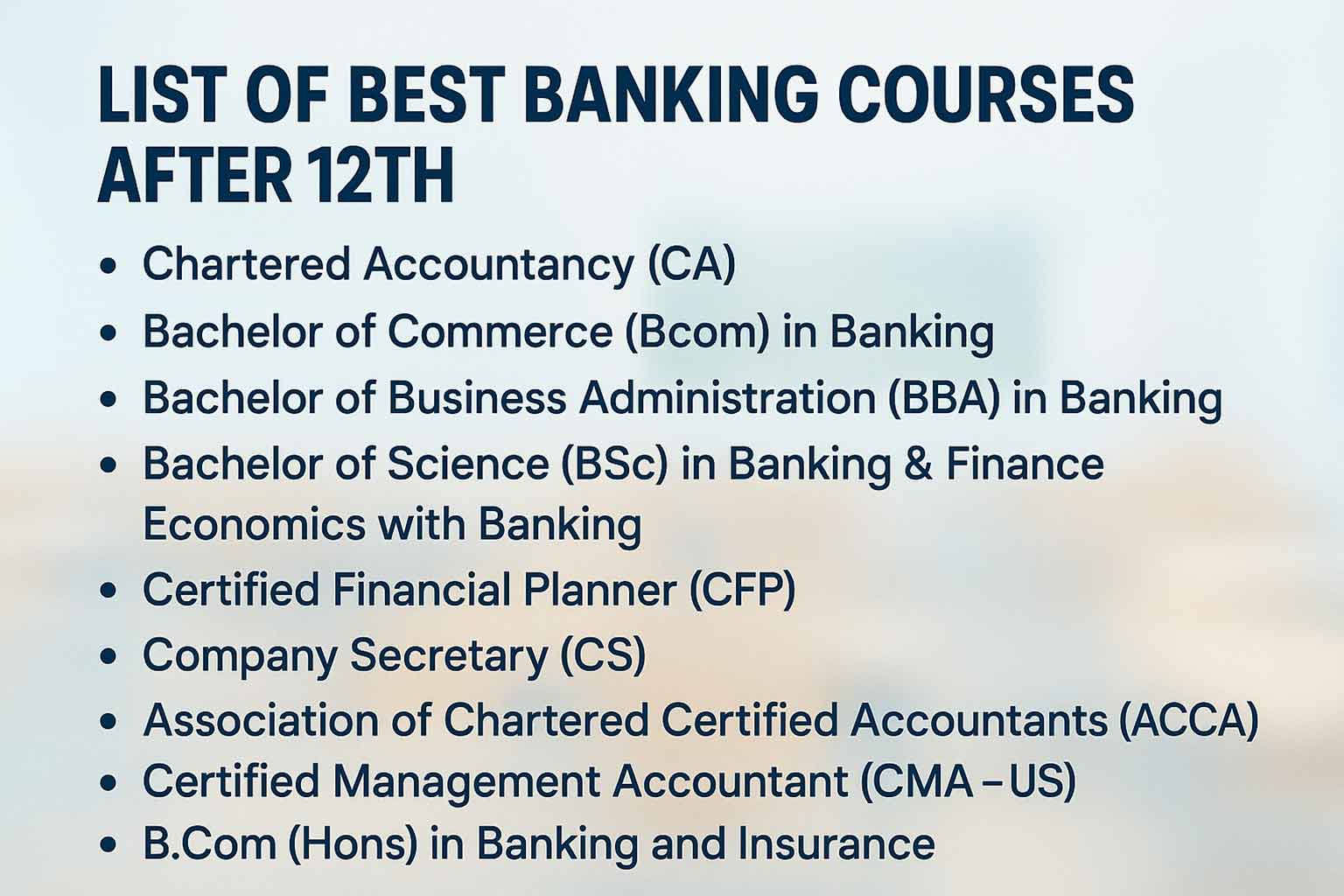A Warm Welcome to CoursesAfter.com!
Are you standing at the crossroads after completing your 12th grade, pondering over the myriad of career paths that lie ahead? The world of finance, particularly banking, often emerges as a promising and stable avenue. If you are inclined towards numbers, have a keen interest in economic trends, and desire to build a robust career, then exploring banking courses after 12th could be your stepping stone to a successful future. This comprehensive guide is designed to illuminate the best banking courses available, offering insights into top career options, eligibility criteria, and associated fees, helping you make an informed decision for your professional journey.
Why Choose Banking Courses After 12th?
The banking sector in India is a dynamic and ever-evolving industry. It’s not just about managing money; it’s about innovation, technology, customer service, and strategic financial planning. Pursuing banking courses after 12th grade offers a multitude of advantages:
- Diverse Career Paths: From traditional roles in commercial banking to cutting-edge positions in fintech and investment, the banking sector offers a wide array of career options. You can specialize in areas like retail banking, corporate banking, risk management, wealth management, or even international finance.
- Job Stability and Growth: The banking industry is a fundamental pillar of any economy, ensuring a high degree of job stability. With consistent growth and expansion, particularly in digital banking, there’s a continuous demand for skilled professionals.
- Competitive Salaries: Careers in banking often come with attractive salary packages, which tend to increase significantly with experience and specialization.
- Skill Development: These courses equip you with a robust set of skills, including financial analysis, critical thinking, problem-solving, communication, and technological proficiency, all of which are highly valued across various industries.
- Contribution to the Economy: Working in banking allows you to play a vital role in the economy by facilitating financial transactions, providing credit, and supporting businesses and individuals in achieving their financial goals.
- Professional Development: The banking sector encourages continuous learning and professional development, with opportunities for various certifications and advanced degrees that can further your career.
List of Banking Courses After 12th

After completing your 12th standard, a range of undergraduate and professional courses can lead you into the banking sector. These courses vary in duration, depth, and specialization, allowing you to choose one that aligns with your interests and career aspirations.
Chartered Accountancy (CA)
- Duration: 4 to 5 years (typically involves articleship/practical training)
- Eligibility: 12th pass (any stream, preferably commerce). Students can register for the CA Foundation course after 10th and appear for the exam after 12th.
- Career Options: Chartered Accountant, Tax Consultant, Auditor, Financial Analyst, CFO, Management Consultant
- Fees: ICAI registration fees are modest, but coaching classes may range from ₹1,00,000 to ₹3,00,000+
- Salary Range: ₹6 to 15 LPA for freshers; experienced CAs may earn ₹10 to 30 LPA or more
Bachelor of Commerce (BCom) in Banking & Finance
- Duration: 3 years
- Eligibility: 12th pass (any stream, commerce preferred) with 45–50% minimum aggregate
- Career Options: Bank Clerk, Probationary Officer (via exams), Financial Analyst, Account Assistant, Relationship Manager, Loan Officer
- Fees: ₹50,000 to ₹2,00,000 per annum
- Salary Range: ₹3 to 6 LPA for entry-level positions
Bachelor of Business Administration (BBA) in Banking & Finance
- Duration: 3 years
- Eligibility: 12th pass (any stream) with 45–50% minimum aggregate; some colleges may prefer a Math background
- Career Options: Financial Services Executive, Retail Banking Executive, Wealth Management Trainee, Financial Planner, Business Development Manager
- Fees: ₹1,00,000 to ₹3,00,000 per annum
- Salary Range: ₹3.5 to 7 LPA for freshers
Bachelor of Science (BSc) in Banking & Finance / Economics with Banking
- Duration: 3 years
- Eligibility: 12th pass with Mathematics (science or commerce stream) and a minimum 50% aggregate
- Career Options: Financial Analyst, Investment Research Analyst, Data Analyst (finance), Risk Analyst, Economic Consultant
- Fees: ₹1,00,000 to ₹2,50,000 per annum
- Salary Range: ₹4 to 8 LPA for entry-level roles
Certified Financial Planner (CFP)
- Duration: 6 months to 2 years (can be pursued alongside graduation)
- Eligibility: 12th pass; bachelor’s degree preferred for better career prospects
- Career Options: Financial Planner, Wealth Manager, Investment Advisor, Financial Consultant
- Fees: ₹50,000 to ₹1,50,000 depending on institute and study mode
- Salary Range: ₹4 to 10 LPA; significantly higher with experience
Company Secretary (CS)
- Duration: 3 to 4 years (involves multiple stages)
- Eligibility: 12th pass (any stream, commerce preferred); can register for CS Foundation/CSEET after 12th
- Career Options: Company Secretary, Compliance Officer, Legal Advisor, Corporate Governance Professional, Board Member
- Fees: ICAI registration fees are moderate; coaching can cost ₹80,000 to ₹2,50,000
- Salary Range: ₹4 to 12 LPA for freshers; ₹8 to 25 LPA or more with experience
Association of Chartered Certified Accountants (ACCA)
- Duration: 2 to 3 years (can be pursued alongside graduation)
- Eligibility: 12th pass (any stream, good scores in English and Maths/Accounts); BCom graduates may get exemptions
- Career Options: Financial Accountant, Auditor, Tax Consultant, Management Accountant, Financial Analyst (global opportunities)
- Fees: ₹2,00,000 to ₹4,00,000 depending on provider and exam structure
- Salary Range: ₹4 to 10 LPA in India; higher internationally
Certified Management Accountant (CMA – US)
- Duration: 6 months to 1 year (can be done after/during graduation)
- Eligibility: Bachelor’s degree or relevant professional certification; you can study after 12th, but you need a degree to certify
- Career Options: Management Accountant, Financial Analyst, Budget Analyst, Cost Accountant, Finance Manager
- Fees: ₹1,00,000 to ₹2,00,000 including exam fees and study material
- Salary Range: ₹5 to 12 LPA for entry to mid-level roles in India
B.Com (Hons) in Banking and Insurance
- Duration: 3 years
- Eligibility: 12th pass (commerce preferred) with a minimum aggregate
- Career Options: Bank Operations Executive, Insurance Agent, Underwriter, Claims Adjuster, Financial Sales Executive
- Fees: ₹70,000 to ₹2,50,000 per annum
- Salary Range: ₹3 to 6.5 LPA for freshers
Bachelor of Financial Markets (BFM)
- Duration: 3 years
- Eligibility: 12th pass (any stream, commerce preferred) with a minimum aggregate
- Career Options: Stockbroker, Equity Research Analyst, Portfolio Manager (assistant), Investment Banking Analyst (entry-level)
- Fees: ₹60,000 to ₹2,00,000 per annum
- Salary Range: ₹3.5 to 7 LPA for entry-level positions
Diploma in Banking Courses After 12th
For students looking for a shorter, more focused entry into the banking sector, diploma courses offer a practical pathway. These programs typically emphasize job-oriented skills and can be an excellent stepping stone for further education or direct employment.
Diploma in Banking and Finance
- Duration: 6 months to 1 year
- Eligibility: 12th pass (any stream) with a minimum aggregate percentage (typically 45–50%)
- Career Options: Bank Teller, Customer Service Executive, Loan Processing Assistant, Back Office Executive, Financial Sales Representative
- Fees: ₹10,000 to ₹1,00,000 depending on the institute
- Salary Range: ₹2.5 to 4.5 LPA; entry-level roles with growth potential through experience or further education
Diploma in Retail Banking
- Duration: 6 months to 1 year
- Eligibility: 12th pass (any stream)
- Career Options: Retail Bank Officer, Customer Relationship Associate, Branch Operations Assistant, Sales Officer (banking products)
- Fees: ₹20,000 to ₹80,000
- Salary Range: ₹2.8 to 4.8 LPA; focused on customer-facing functions in banking
Diploma in Investment Banking Operations
- Duration: 3 months to 1 year
- Eligibility: 12th pass (commerce or science stream preferred) with interest in financial markets
- Career Options: Operations Analyst (Investment Banks), Back Office Executive, Trade Support Analyst
- Fees: ₹30,000 to ₹1,20,000
- Salary Range: ₹3 to 6 LPA; opens doors to niche investment banking support roles
Advanced Certificate in Banking Laws and Loan Management
- Duration: 3 to 6 months
- Eligibility: 12th pass; useful for those in or targeting loan-related banking roles
- Career Options: Loan Officer Assistant, Credit Operations Executive, Compliance Assistant (loan regulations)
- Fees: ₹15,000 to ₹50,000
- Salary Range: ₹3 to 5 LPA; enhances specialized knowledge in lending and compliance
Professional Program in Commercial Banking
- Duration: 6 months to 1 year
- Eligibility: 12th pass
- Career Options: Commercial Banking Assistant, Business Banking Support, Relationship Management Trainee
- Fees: ₹40,000 to ₹1,00,000
- Salary Range: ₹3 to 5 LPA; tailored for careers in business-focused banking services
Top Banking Courses After 12th with Salary
Here’s a table summarizing some of the most popular banking courses after 12th and their approximate salary ranges. It’s important to remember that salaries can vary significantly based on the institute, individual skills, experience, and the employing organization (public vs. private sector, type of bank, etc.).
| Course Name | Duration (Approx.) | Eligibility (General) | Average Starting Salary (LPA) | Growth Potential/Max Salary (LPA) |
| Chartered Accountancy (CA) | 4-5 years | 12th pass (any stream) | ₹7 – ₹12 | ₹20 – ₹50+ |
| B.Com in Banking & Finance | 3 years | 12th pass (any stream, 45-50% aggregate) | ₹3 – ₹6 | ₹8 – ₹15 |
| BBA in Banking & Finance | 3 years | 12th pass (any stream, 50% aggregate) | ₹3.5 – ₹7 | ₹9 – ₹18 |
| B.Sc in Finance/Actuarial Science | 3 years | 12th pass (Maths/Stats compulsory, 50-60% aggregate) | ₹4 – ₹8 | ₹10 – ₹25+ |
| Diploma in Banking & Finance | 6 months – 1 year | 12th pass (any stream, 45-50% aggregate) | ₹2 – ₹4 | ₹5 – ₹8 |
| Certified Financial Planner (CFP) (Post-UG) | 6 months – 1 year | Graduate (can start foundation level after 12th for some modules like investment plan) | ₹4 – ₹8 | Graduate (can start foundation level after 12th for some modules, like investment plan) |
Note: The salary ranges are indicative and can vary based on various factors. Professional certifications like CFA (Chartered Financial Analyst) and FRM (Financial Risk Manager) are typically pursued after graduation and can significantly boost earning potential in specialized finance roles.
Top Colleges & Institutes in India
Choosing the right institution is crucial for a strong foundation in banking and finance. India boasts several reputable colleges and institutes offering excellent programs. Here are some of the popular choices, known for their strong faculty, curriculum, and placement records:
- Shaheed Sukhdev College of Business Studies, Delhi University
- Narsee Monjee College of Commerce and Economics, Mumbai
- Symbiosis Institute of Business Management (SIBM), Pune
- Christ University, Bangalore
- Amity University (various campuses)
- Indian Institute of Management (IIMs) – for postgraduate programs in finance (after graduation)
- Indian Institute of Banking & Finance (IIBF) – offers professional certifications and diplomas
- Loyola College, Chennai
- St. Joseph’s College of Commerce, Bangalore
- Delhi Technological University (DTU), Delhi
- Jain University, Bangalore
- Woxsen University, Hyderabad
- K. J. Somaiya College of Arts & Commerce, Mumbai
- S. P. Jain Institute of Management and Research, Mumbai (for PG courses)
- ICFAI Foundation for Higher Education (IFHE), Hyderabad
These institutions are recognized for their rigorous academics, industry connections, and ability to prepare students for the demands of the financial sector. When choosing a college, consider factors such as curriculum, faculty expertise, infrastructure, industry collaborations, and placement assistance.
Conclusion
Embarking on a career in banking after your 12th grade can be a highly rewarding decision, offering stability, growth, and diverse opportunities. The wide array of banking courses after 12th, from comprehensive undergraduate degrees like B.Com and BBA to specialized diplomas and professional certifications, ensures that there’s a path for every aspiring financial professional. Whether you envision yourself as a meticulous accountant, a dynamic investment banker, or a customer-focused relationship manager, a solid educational foundation is your first step.
Thoroughly research each course, understand its eligibility requirements, fee structure, and the career paths it opens. Remember to also consider your aptitude for subjects like mathematics, economics, and analytical thinking, as these are crucial for success in the banking and finance domain. With dedication and the right choice of course and institution, you can unlock a promising and impactful career in India’s vibrant banking sector. We at CoursesAfter.com wish you the very best in your academic and professional endeavors!

